“I urge you to listen to the voice of the youth”
Audience to the Members of the "Fondation Internationale Religions et Sociétés"
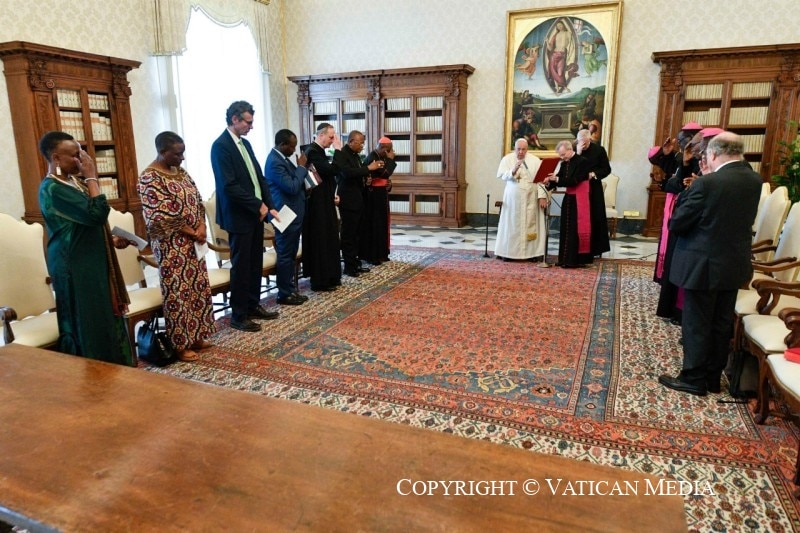
This morning, the Holy Father Francis received in Audience the Members of the “Fondation Internationale Religions et Sociétés”.
We publish below the speech that the Pope addressed to those present at the audience:
Address of the Holy Father
Good morning to you all… Dear brothers and sisters, good morning!
I am pleased to welcome you today, along with the important news you bring with you, that of the “African Educational Pact”.
I know that this Pact is the fruit of the International Symposium you held last November in Kinshasa, with the patronage of the Episcopal Conference of the Congo, organized by the International Foundation of Religions and Society and the Catholic University of the Congo.
In that Symposium, attended by numerous bishops, priests, scientists and scholars from various African countries, and beyond, you reinterpreted in African style the Global Educational Compact, which I launched in September 2019. I congratulate you, because you were the first to produce a continental Educational Pact. You have shown that you have well understood what I was aiming for with this initiative, that is, that the Global Educational Compact should become a local reality, the result of reflections carried out from your own context and cultural resources, and that it should be attentive to the educational needs of the territory.
As you know, since the beginning, I thought of this project in the light of a proverb from your African wisdom, to emphasize that community dimension of education that has always been part of your centuries-long educational tradition: “To educate a child, it takes an entire village”. It is an educational alliance ideally underwritten by all members of the village, for whom the task of accompanying each child is not the exclusive responsibility of the father and the mother, but of all members of the community. Everyone, therefore, has the duty to support education, which is always a choral process. In education, we must risk more and speak as a choir. Last February, speaking to the Pontifical academic and educational institutions, I said: “Be a choir”. I am saying the same to Africa: “Be a choir”. This community dimension of existence is perfectly expressed in the famous African aphorism, “I am because we are”.
The African Educational Pact should contribute not only to recovering and strengthening this community and horizontal dimension of relations, but also to highlighting the other, equally ancient, vertical dimension: the relation with God. Some African peoples, as we know, came to conceive of monotheism well before other civilizations. Subsequently, Africa opened up with great enthusiasm to Christian proclamation and it is currently the continent that sees the greatest increase in the number of Christians and Catholics. Therefore, the African Educational Pact, besides the motto “I am because we are”, is based with justifiable pride, on the affirmation, “I am because we are and we believe”. There is faith there.
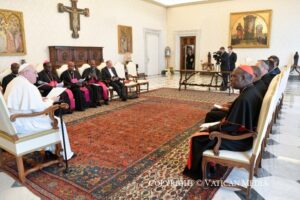 You, brothers, are the shepherds of the youngest continent in the world: your greatest wealth is indeed them, the young. When I had that Zoom call with young African university students, I was astounded by the level of intelligence of those young people … smart, intelligent. And I commented on this. I urge you to listen to the voice of the young, and their ideas, without authoritarianism: the Spirit also speaks through them, and I am sure that they will be able to suggest good and surprising things to you.
You, brothers, are the shepherds of the youngest continent in the world: your greatest wealth is indeed them, the young. When I had that Zoom call with young African university students, I was astounded by the level of intelligence of those young people … smart, intelligent. And I commented on this. I urge you to listen to the voice of the young, and their ideas, without authoritarianism: the Spirit also speaks through them, and I am sure that they will be able to suggest good and surprising things to you.
May you invest your best energies in their education. After the policies of mass education, which characterized the first post-colonial decades, it is time to work together with local governments for the ever-greater qualification of education, especially by training teachers well, valuing them and creating the conditions necessary for the dignified exercise of their profession.
We look at Africa with great confidence, because it has everything it needs to be a continent capable of charting future paths. I refer not only to the major mining resources and to economic progress and peace processes; I think above all of educational resources: the values of traditional African education, especially those of hospitality, welcome, solidarity; these are values that integrate perfectly in the Educational Pact. Christianity matches the best part of every culture and helps to purify what is not authentically human, and therefore not divine either.
You can count on the thought of many African philosophers and pedagogues. In this way you will be able to imitate the example of many figures of missionary educators and statesmen educators such as, for example, Nelson Mandela, who in his country, oppressed by apartheid, rebuilt unity between the different races through reconciliation and education. Indeed, he maintained that education is the most powerful tool that can be used to change the world.
You can also be inspired by another great statesman, the Servant of God Julius Nyerere, known as the “teacher”, who was able to create educational policies for the growth of all his countrymen, regardless of economic or social conditions. He was sustained by his Catholic faith and stated that without the celebration of the Eucharist it would have been impossible for him to fulfil his work.
Dear brothers and sisters, with the African Educational Pact, you once again confirm the words of Pliny the Elder: “Ex Africa semper aliquid novi”, “Africa always brings forth something new”. This Pact is a novelty that is developing from two great roots: traditional culture and the Christian faith. And, as another African proverb says, “When the roots are deep, there is no reason to fear the wind”.
I thank you for your commitment, and I hope that the African Educational Pact will also be followed by other continents. May the Virgin Mary, Mother of Africa, accompany you. I bless you from my heart and I ask you, please, to pray for me.
_____________________________________________
Holy See Press Office Bulletin, 1st June 2023
Related

More than a Decade of Service, Reform, and Hope
Exaudi Staff
21 April, 2025
4 min
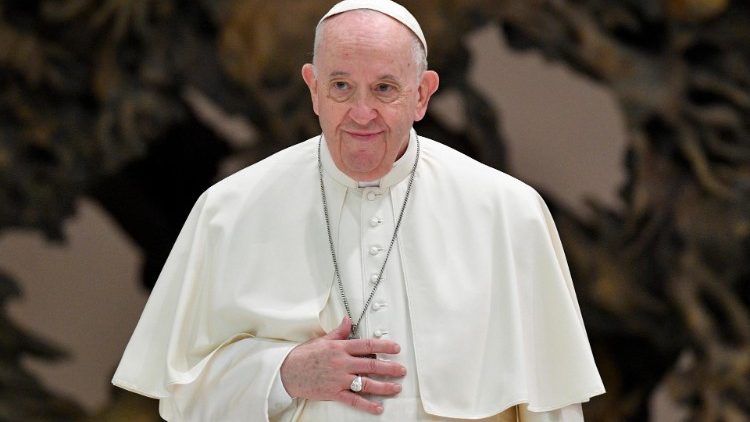
The Pontificate of Pope Francis: A Leadership of Compassion and Renewal for the Church
Exaudi Staff
21 April, 2025
3 min
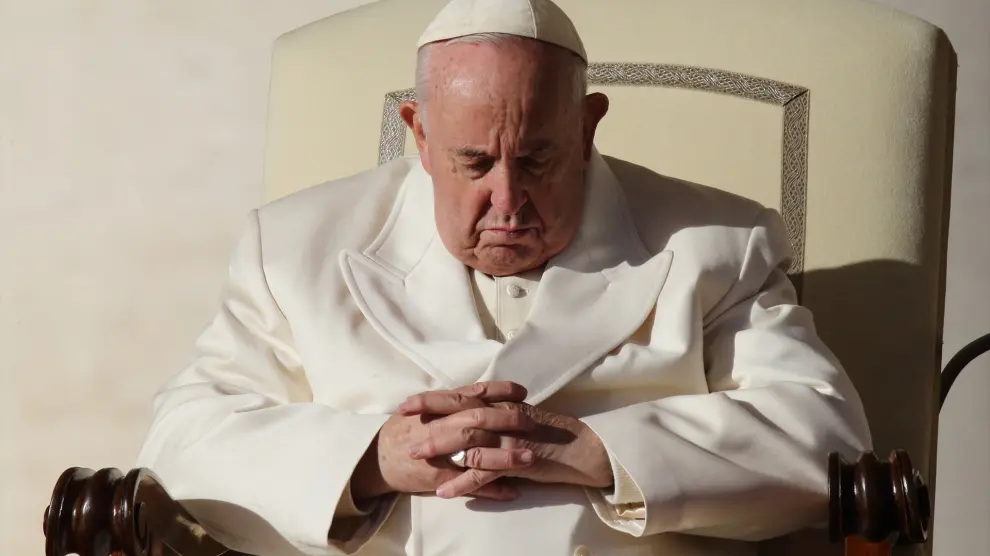
Pope Francis has died
Exaudi Staff
21 April, 2025
2 min
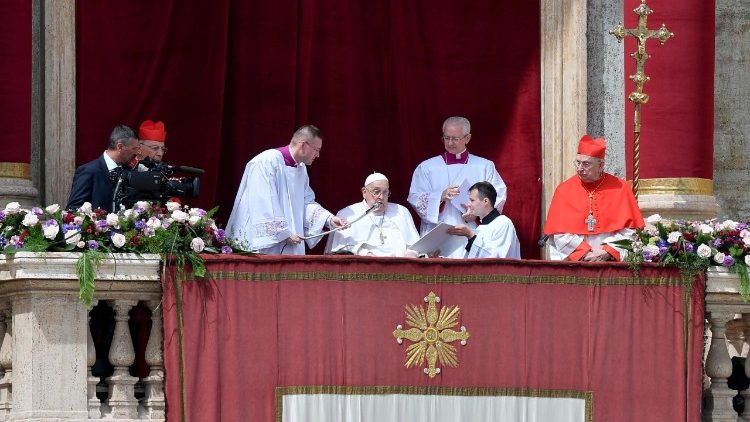
Pope Francis Calls for Global Peace in His Easter Message
Exaudi Staff
20 April, 2025
2 min
 (EN)
(EN)
 (ES)
(ES)
 (IT)
(IT)

